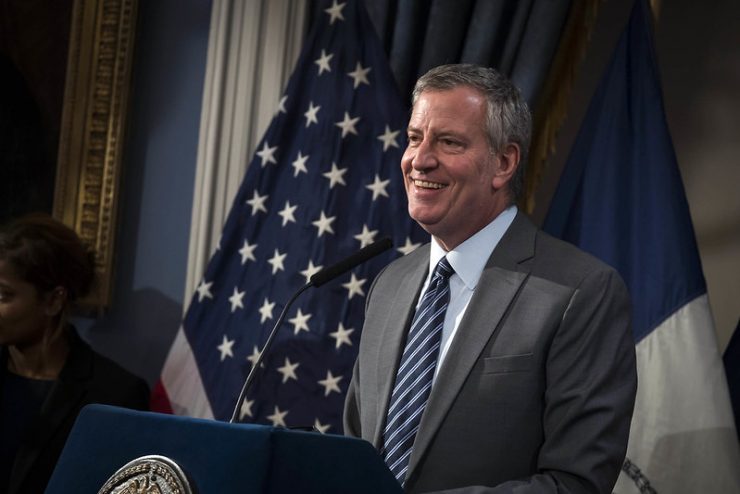It may be $3 billion higher than the current budget plan, but Mayor Bill de Blasio’s $95.3 billion preliminary city spending plan for 2020-21 takes a cautious tone, as the city worries about how Albany will tackle a projected $6 billion budget deficit.
While outlining his projected budget on Jan. 16, de Blasio said there has been less fiscal growth for the city this year due to the $1.6 billion spent on labor settlements and investments, $270 million in debt services, $256 million in education mandates like special education and charter school costs along with $175 million in criminal justice mandates including bail reform.
In a statement about the 2020 budget growth rate, officials said that the city’s preliminary budget reflects an increase in tax revenues with an expected growth rate of 4.6 percent. Officials predict a much smaller growth rate — 2 percent — for 2021 revenue, reflecting slowing local and national economies.
The announcement comes three weeks earlier than when the mayor presented the city’s preliminary budget last year and five days before Governor Andrew Cuomo is scheduled to give details on his own financial plan for the state. During his Jan. 8 State of the State address, Cuomo proposed making localities cough up more money for Medicaid, which makes up $4 billion worth of the deficit.
“The situation is very straightforward and our focus is in one place and it’s Albany, New York,” said the mayor, who added that the “worrisome” deficit was the largest he had every seen in the state during his tenure. If Cuomo were to call for cuts to Medicaid, it would roll back years of progress to the city’s NYC Health + Hospitals system, De Blasio said, which was close to bankruptcy when he took office six years ago.
A spokeswoman for the Cuomo, Dani Lever, was quick to push back against de Blasio’s assumptions about Cuomo’s upcoming preliminary state budget, stating that “we have heard of smoke and mirrors and political straw men, but how the mayor can claim he is reacting to cuts from the state before the state has even proposed a budget is spreading the political cream cheese too thick even for a toasted bagel.”
The bagel and cream cheese reference was used as a jab to Mayor de Blasio’s tweet on National Bagel Day (Jan. 15) stating his preferred bagel was whole wheat, toasted with extra cream cheese. The mayor deleted the post and retweeted his bagel order, but without the word toasted, as bagel aficionados mocked him for what many consider to be a sin against the New York breakfast staple.
The second financial challenge for the city’s budget is the the Metropolitan Transportation Authority, De Blasio said. Demands for $3 million in capital funding and $100 million for Access-A-Ride, a paratransit service for New Yorkers with disabilities or mobility issues, would be denied until a proper audit of the agency’s culture and operations was done. State Comptroller Tom DiNapoli released an MTA audit roughly six months ago calling for greater oversight of the agency’s contracts.
“We are not going to keep handing over money unless the money is going to be used well,” said de Blasio. A proper audit of the MTA’s culture and operations would need to be done before the mayor could agree to “fork over” money to agency, whose board members are nominated by the governor.
The mayor did note that he would he would be willing to spend on things like $147 million in wages and benefits for uniform workers, $33 million to aid resiliency efforts at Rockaway Beach and Vision Zero, specifically $98 billion for Fourth Avenue in Brooklyn to make the thoroughfare safer for pedestrians, cyclists and drivers. The city as also set aside roughly $6 billion in reserves.
“The budget presented today holds the line on new spending programs, which is a welcome and positive change, said the Citizens Budget Commission President Andrew Rein. “However, it misses the opportunity to further improve the city’s preparedness for looming risks — including potential cuts in state aid or weaknesses in the economy.”































